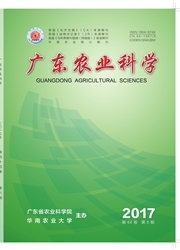

 中文摘要:
中文摘要:
为了解一氧化氮(NO)处理对番木瓜果实乙烯生物合成的影响,采用60υL,LNO熏蒸处理采收成熟度为果皮浅绿并微带黄色痕迹的番木瓜果实3h,然后在20℃和相对湿度为85%条件下贮藏20d。研究NO对番木瓜乙烯、1-氨基环丙烷-1-羧酸(ACC)、丙二酰-1-氨基环丙烷-1-羧酸(MACC)、ACC合成酶(ACS)和ACC氧化酶(ACO)及cpACS2和印AC01基因表达的影响。结果表明,NO处理降低了番木瓜果实乙烯释放量、ACO的活性及CpAC01基因的表达.导致贮藏过程果实ACC和MACC的积累,但对ACS的活性及印ACS2基因的表达无显著抑制作用。
 英文摘要:
英文摘要:
Effects of nitric oxide (NO) on ethylene biosynthesis in papaya fruit were investigated. Papaya fruit harvested at light green with some hint of yellow at the blossom end, were first fumigated with 60 υL/L NO for 3 h, then stored at 20℃ with 85% relative humidity (RH) for 20 days. Changes in the levels of ethylene, 1-aminocyclopropane-1-carboxylic acid (ACC), 1- malonylaminoeyelopropane-l-earboxylie acid (MACC), as well as the activities of ACC synthase (ACS), ACC oxidase (ACO) and the expression of CpACS2 and CpAC01 genes were measured during papaya ripening. The results showed that NO treatment inhibited ethylene production, ACO activity and the expression of CpA CO1 gene, leading to the accumulation of ACC and MACC during storage. However, ACS activity and the expression of CpA CS2 gene were not suppressed significantly by NO treatment.
 同期刊论文项目
同期刊论文项目
 同项目期刊论文
同项目期刊论文
 Identification of (()-epicatechin as the direct substrate for polyphenol oxidase from longan fruit p
Identification of (()-epicatechin as the direct substrate for polyphenol oxidase from longan fruit p Crucial roles of membrane stability and its related proteins in the tolerance of
peach fruit to chil
Crucial roles of membrane stability and its related proteins in the tolerance of
peach fruit to chil Responses of reactive oxygen metabolism and quality in mango fruit to exogenous oxalic acid or salic
Responses of reactive oxygen metabolism and quality in mango fruit to exogenous oxalic acid or salic Effect of ATP on changes of fatty acids in harvested litchi fruit infected by Peronophythora litchii
Effect of ATP on changes of fatty acids in harvested litchi fruit infected by Peronophythora litchii A comparative identification of Ochratoxin A in longan fruit pulp by high-performance liquid chromat
A comparative identification of Ochratoxin A in longan fruit pulp by high-performance liquid chromat Peach fruit acquired
tolerance to low temperature stress by accumulation of linolenic acid and N-acy
Peach fruit acquired
tolerance to low temperature stress by accumulation of linolenic acid and N-acy Differential expression of Expansin and XET genes associated with aril breakdown in harvested longan
Differential expression of Expansin and XET genes associated with aril breakdown in harvested longan Purification and characterization of anthocyanin degradation enzyme from litchi anthocyanin degradat
Purification and characterization of anthocyanin degradation enzyme from litchi anthocyanin degradat Effects of cold storage duration on subsequent quality, energy and membrane permeability and lipid d
Effects of cold storage duration on subsequent quality, energy and membrane permeability and lipid d Antioxidant activities and contents of polyphenoloxidase substrates from pericarp tissue of litchi f
Antioxidant activities and contents of polyphenoloxidase substrates from pericarp tissue of litchi f Isolation and characterization of three ethylene perception elements and their expressions during lo
Isolation and characterization of three ethylene perception elements and their expressions during lo 期刊信息
期刊信息
